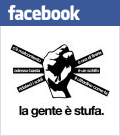Though the singer - Bernardo Lanzetti from Acqua Fragile - doesn't have a versatile voice, the lyrics are brilliant and imaginative: they are a work by singer/songwriter Gianfranco Manfredi, who privileged levity above his usual causticity for the occasion. What's more, the music makes a resolved step towards the incorporation of folkloric material: the resulting sound is a hybrid of jazz-rock fusion in the vein of Weather Report and Mediterranean suggestions which remind of Area (compound meters in profusion!) but show a very personal acoustic edge.
Everything converges to a surprisingly breezy album, where the instrumental skill of the musicians doesn't suffocate the pop appeal of the music, but weaves smart woofs which enhance it with class and moderation .
"Passpartù" ninth studio release from P.F.M., and the second without their well-known violinist Mauro Pagani. Many tracks feature Roberto Colombo on keyboards - later a key producer of Italian new wave.
Tracklist:
- Viene il santo
- Svita la vita
- Se fossi cosa
- Le trame blu
- Passpartù
- I cavalieri del tavolo cubico
- Su una mosca e sui dolci
- Fantalità
Download (128 kbps)
Similar albums on the blog:
Gianfranco Manfredi: Zombie di tutto il mondo unitevi (Ultima spiaggia, 1977)
Alberto Fortis: omonimo (1979)










